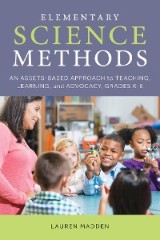Details

Elementary Science Methods
An Assets-Based Approach to Teaching, Learning, and Advocacy, Grades K-6|
42,99 € |
|
| Verlag: | Rowman & Littlefield Publishers |
| Format: | |
| Veröffentl.: | 12.01.2022 |
| ISBN/EAN: | 9781538127131 |
| Sprache: | englisch |
| Anzahl Seiten: | 216 |
DRM-geschütztes eBook, Sie benötigen z.B. Adobe Digital Editions und eine Adobe ID zum Lesen.
Beschreibungen
<p><a></a><span>As teachers and parents, we often hear that children are the best scientists. Great science teachers tune in to children’s interests and observations to create engaging and effective lessons. This focus on the innate curiosity of children, or humans overall is celebrated and used to justify and support efforts around STEM teaching and learning. Yet, when we discuss elementary school teachers, we often hear many inside and outside the classroom report that these teachers dislike, fear, and feel uncomfortable with science. This is exactly the opposite approach from what is universally recommended by science education scholars.</span><a></a></p>
<p><span>This practical textbook meets the immediate, contextual needs of future and current elementary teachers by using an assets-based approach to science teaching, showing how to create inquiry-based lessons, differentiate instruction and lesson design based on children’s developmental ages and needs, and providing easy-to-use tools to advocate for scientific teaching and learning guided by the Next Generation Science Standards (NGSS).</span></p>
<p><span>This practical textbook meets the immediate, contextual needs of future and current elementary teachers by using an assets-based approach to science teaching, showing how to create inquiry-based lessons, differentiate instruction and lesson design based on children’s developmental ages and needs, and providing easy-to-use tools to advocate for scientific teaching and learning guided by the Next Generation Science Standards (NGSS).</span></p>
<p><span>This book is designed to meet the needs of future elementary teachers preparing to teach science using an assets-based approach to science teaching and tools for advocating for scientific teaching and learning with respect to the NGSS. </span></p>
<p></p>
<p></p>
<p><span>Table of Contents </span></p>
<p><span>Forward</span></p>
<p><span>Chapter 1 An Introduction to Assets-Based Elementary Science Teaching</span></p>
<p><span>Chapter 1 Supplementary Lesson: Cookie Chemistry Lesson</span></p>
<p><span>Chapter 2 A Developmental Perspective on Science Teaching and Learning</span></p>
<p><span>Chapter 3 Inquiry-based Teaching- Connecting Theory to Strategy</span></p>
<p><span>Chapter 4 What is (& isn’t) science anyway?</span></p>
<p><span>Chapter 5 The Next Generation Science Standards- an Introduction</span></p>
<p><span>Chapter 6 Asking Good Questions & Developing Lessons</span></p>
<p><span>Chapter 6 Supplementary Lesson: Termite Trails Lesson</span></p>
<p><span>Chapter 7 Connecting Science to Language Arts & Mathematics</span></p>
<p><span>Chapter 7 Supplementary Lesson A: Horseshoe Crab Lesson</span></p>
<p><span>Chapter 8 STEM & STEAM- Creativity and Problem-Solving in Elementary Science</span></p>
<p><span>Chapter 8 Supplementary Lesson: Ride or Diatom Lesson</span></p>
<p><span>Chapter 9 Beginning to Use Science to Advocate</span></p>
<p><span>Chapter 10 Equity, Diversity, and Inclusion in Science Teaching</span></p>
<p><span>Chapter 11 How do we know what we know in science?</span></p>
<p><span>Chapter 12 Science Outside of School</span></p>
<p><span>Chapter 13 Advocating for Science</span></p>
<p><span>Glossary</span></p>
<p></p>
<p></p>
<p><span>Forward</span></p>
<p><span>Chapter 1 An Introduction to Assets-Based Elementary Science Teaching</span></p>
<p><span>Chapter 1 Supplementary Lesson: Cookie Chemistry Lesson</span></p>
<p><span>Chapter 2 A Developmental Perspective on Science Teaching and Learning</span></p>
<p><span>Chapter 3 Inquiry-based Teaching- Connecting Theory to Strategy</span></p>
<p><span>Chapter 4 What is (& isn’t) science anyway?</span></p>
<p><span>Chapter 5 The Next Generation Science Standards- an Introduction</span></p>
<p><span>Chapter 6 Asking Good Questions & Developing Lessons</span></p>
<p><span>Chapter 6 Supplementary Lesson: Termite Trails Lesson</span></p>
<p><span>Chapter 7 Connecting Science to Language Arts & Mathematics</span></p>
<p><span>Chapter 7 Supplementary Lesson A: Horseshoe Crab Lesson</span></p>
<p><span>Chapter 8 STEM & STEAM- Creativity and Problem-Solving in Elementary Science</span></p>
<p><span>Chapter 8 Supplementary Lesson: Ride or Diatom Lesson</span></p>
<p><span>Chapter 9 Beginning to Use Science to Advocate</span></p>
<p><span>Chapter 10 Equity, Diversity, and Inclusion in Science Teaching</span></p>
<p><span>Chapter 11 How do we know what we know in science?</span></p>
<p><span>Chapter 12 Science Outside of School</span></p>
<p><span>Chapter 13 Advocating for Science</span></p>
<p><span>Glossary</span></p>
<p></p>
<p></p>
<p><span>Lauren Madden</span><span> is a professor of Elementary and Early Childhood Education at The College of New Jersey, where she teaches undergraduate and graduate science teaching methods courses and degree capstone courses. She has published science education articles in many peer-reviewed journals, including </span><span>Journal of Science Teacher Education, Science and Children </span><span>(NSTA)</span><span>, Journal of Early Childhood Teacher Education, Research in Science Education, Environmental Education Research, CITE Journal </span><span>(Society for Information Technology and Teacher Education)</span><span>, </span><span>and </span><span>International Journal of Science Education</span><span>. Her research interests include scientist-educator collaboration, intersections of Next Generation Science Standards and Common Core Curriculum Standards, preservice teacher perspectives and attitudes on STEM education, and the uses of interactive science notebooks.</span></p>
Diese Produkte könnten Sie auch interessieren:

Inclusion of Disabled Children in Primary School Playgrounds

von: Marc Armitage, Helen Woolley

21,99 €















